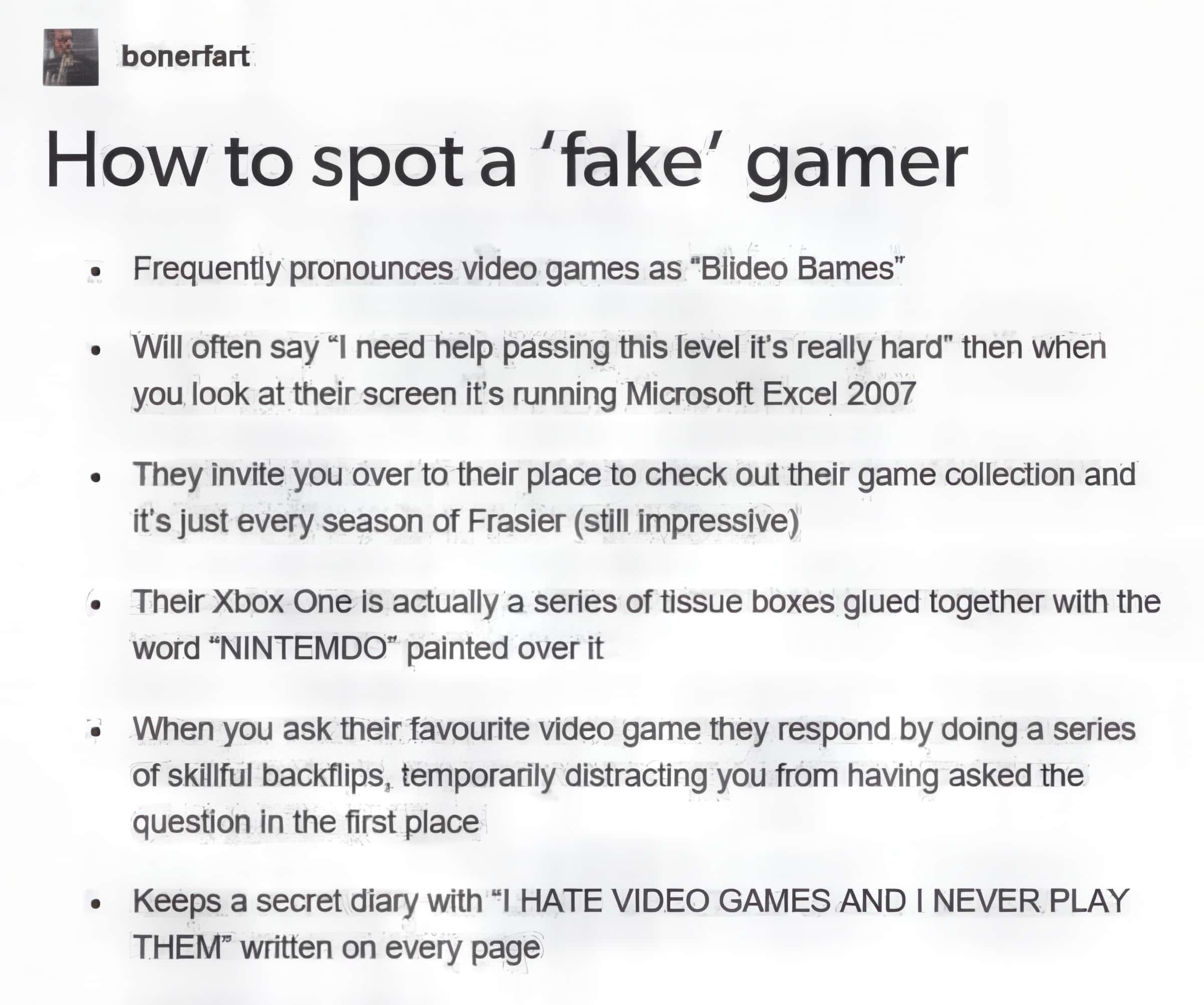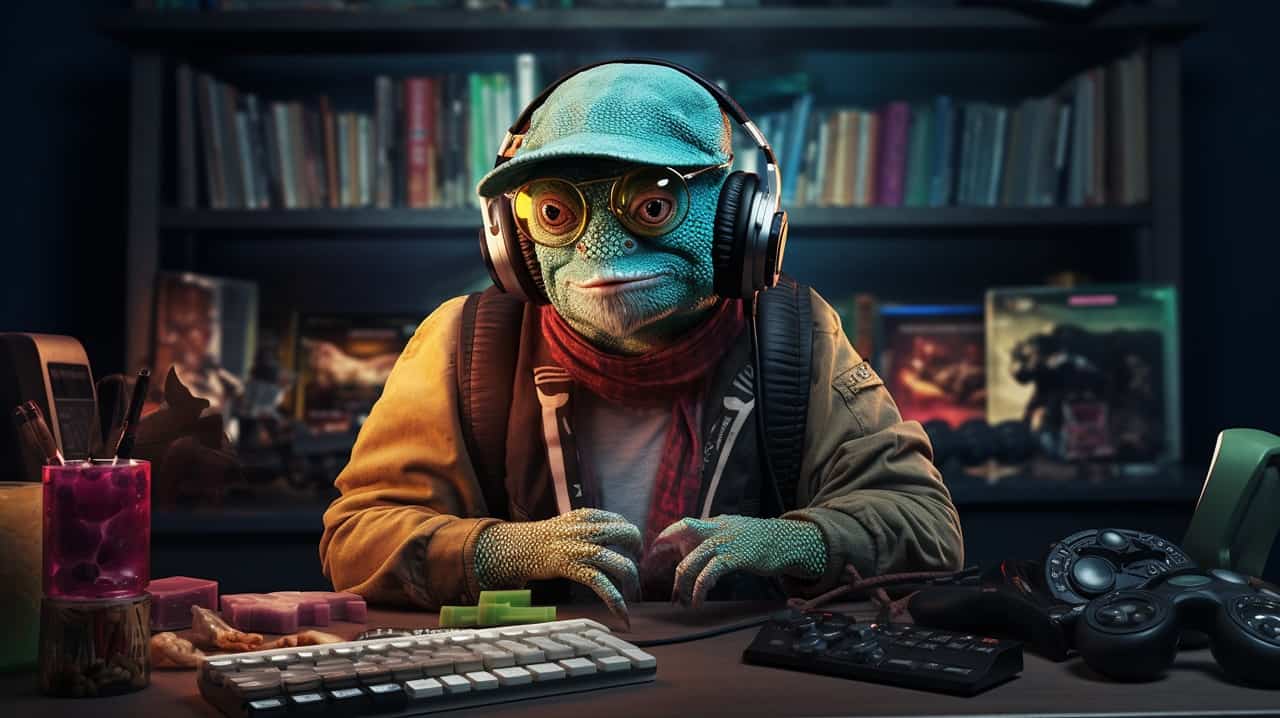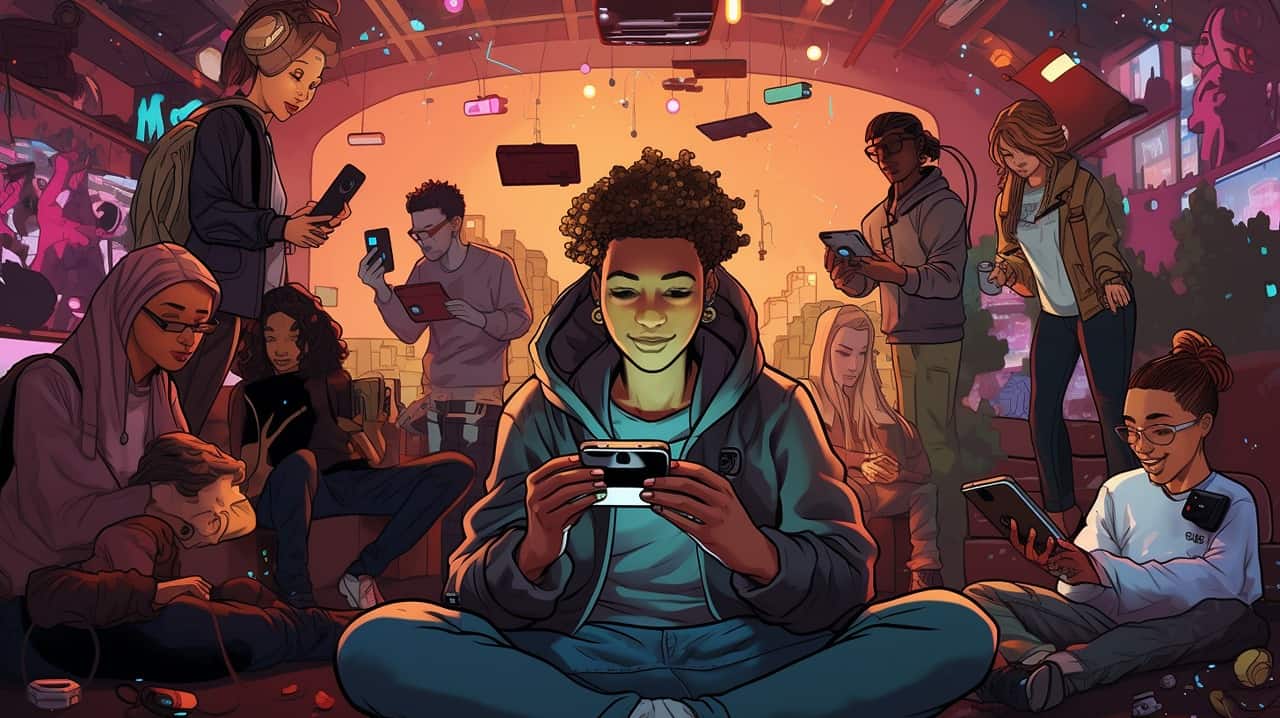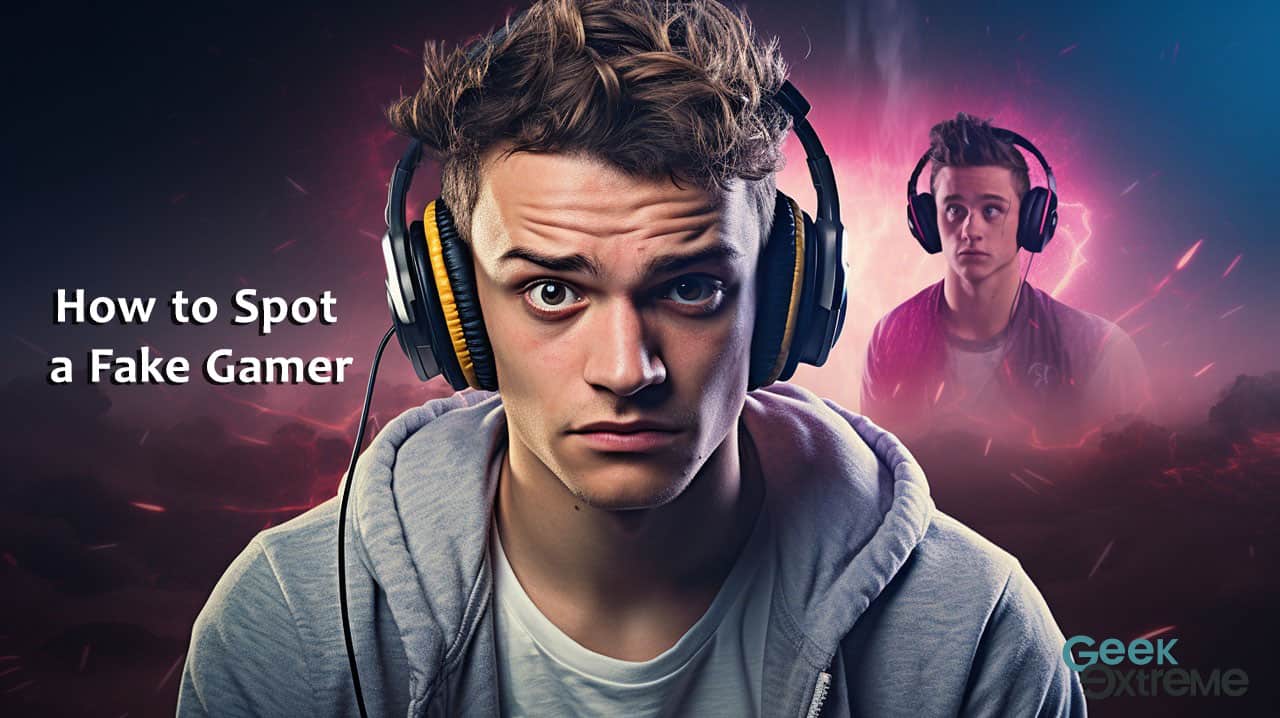I’m an old hand at gaming, living among avatars and high scores.
Lately, I’ve spotted invaders, ‘fake gamers’ polluting our sanctuary. They spout gaming lingo without understanding and claim to love games they’ve never played.
It’s maddening, but I’m here to help. Let’s expose these impostors, not to gatekeep, but to protect our passionate community.
Let’s keep it real, folks.
Key Takeaways
Asking someone to rate their favorite Dark Souls games can determine if they are a fake gamer.
Kingdom Hearts and Paper Mario fans are considered indicators of being a true gamer.
Gamers love wearing unfunny shirts, which are a defining characteristic of gamers.
Strategies to identify and deal with fake gamers include observing their gaming knowledge and skills, engaging in conversations about specific games, paying attention to inconsistencies, and seeking validation from experienced gamers or gaming communities.
Table of Contents
Understanding the Concept of ‘Fake Gamers

I’ve been exploring the concept of ‘Fake Gamers,’ and it’s intriguing to see how they’re identified, from a lack of genuine gaming knowledge to their choice in Dark Souls games. Recognizing signs isn’t always easy, especially when gaming jargon understanding is at play, but there are subtle giveaways. Insincere praises for Dark Souls 2, a game often critiqued by seasoned gamers, can be a red flag.
Identifying imposters is challenging, especially if they’ve armed themselves with a superficial layer of gaming knowledge. They might know the latest games, but probe deeper, and you’ll find a void. Ask about classic titles or complex gaming mechanics, and their answers often betray a lack of depth.
Often, fake gamers seek social validation, using gaming as a status symbol rather than a passion. They’re quick to flaunt their ‘achievements’ but are absent from in-depth discussions about game design or narrative nuances.
True gaming isn’t about exclusivity; it’s about shared passion and camaraderie. Let’s foster a space that welcomes novices and veterans alike, a place where authenticity isn’t questioned but celebrated.
The Emergence and Motivations of ‘Fake Gamers

I’m curious about the emergence of ‘Fake Gamers’ and the motivations driving them to pretend to be part of a community they don’t fully understand. It’s clear that motives behind faking often include attention-seeking and social validation. The desire to fit into a thriving, engaging community can be overwhelming, leading some to don the ‘gamer’ label without truly immersing themselves in the culture.
Common traits of fake gamers include imitation and a lack of genuine knowledge. They may parrot popular gaming phrases or claim to love the flavor-of-the-month game, but their understanding often lacks depth. It’s like they’re playing a game of ‘Simon Says’ but without fully grasping the rules.
This leads to a significant impact on the gaming community, including the dilution of culture and the spread of misinformation. Their superficial engagement can dilute the rich tapestry that makes the gaming community unique. The misinformation they spread can further skew public perception of gaming.
Identifying fake gamers involves observing skills and detecting inconsistencies. Their lack of true knowledge can be spotted in their gaming techniques or their discussions about gaming. But rather than alienating these individuals, we should push for promoting authenticity through inclusivity and challenging stereotypes, fostering a community that welcomes all who truly love gaming.
The Effects of ‘Fake Gamers’ on the Gaming Culture

In the gaming culture, it’s evident that ‘Fake Gamers’ can contribute to a toxic environment, undermining the achievements of genuine gamers and diluting the essence of our community. Their presence tends to impact the gaming community’s values negatively, as they often spew misinformation and false narratives, leading to confusion and discord among players.
These imposters pose a significant challenge, particularly when it comes to recognizing and addressing community issues. Their lack of genuine gaming knowledge creates a void, a disconnection from the real issues that we face as a gaming community. Their focus usually strays away from constructive dialogue and shifts towards gaining attention, further fostering a toxic gaming environment.
The perpetuation of false narratives and the undermining of genuine gamers are just the tip of the iceberg. The deeper we delve, the more we realize the monstrous impact of this insidious culture on our beloved gaming community.
It’s high time we addressed this issue head-on, liberating our community from the shackles of pretentiousness and deception. The journey towards a more inclusive and authentic gaming environment begins with acknowledging and tackling the ‘Fake Gamer’ issue.
Techniques to Recognize and Handle ‘Fake Gamers
We’ll now turn to how you can pick up on ‘fake gamers’ and, once identified, how you should handle them. Identifying gaming knowledge is your first line of defense. It’s the basis of any true gamer’s repertoire. If someone can’t detail the lore of a beloved franchise or recount their epic boss battles, there’s a good chance they’re faking it.
Engaging in gaming conversations is the next step. Ask about their favorite games, their play styles, and their gaming rig. Genuine gamers can chat for hours about their passion. However, beware of parroted opinions or generic statements – they’re telltale signs of a poser.
Detecting inconsistencies and contradictions in their stories is key as well. If someone claims to be a ‘Dark Souls’ veteran but can’t remember the name of any bosses, they’re likely not the gamer they claim to be.
Once you’ve identified a fake gamer, don’t be harsh. Instead, seek validation from experienced gamers. Promote inclusivity in gaming – let them know it’s okay to be new or not know everything. After all, we were all beginners once. Together, we can build a more authentic and welcoming gaming community.
Fostering a Genuine and Diverse Gaming Environment

Both fostering a genuine gaming environment and promoting diversity are critical, but it’s equally important that we respect all gamers and their unique experiences.
As a seasoned gaming enthusiast, I’ve seen how the industry has evolved, and I believe that promoting inclusivity is our key to a progressive gaming community.
Embracing diverse perspectives enriches our gaming experiences, displaying a broad spectrum of ideas and strategies that we may not have considered. This diversity fuels innovation within gaming narratives and mechanics, pushing the boundaries of what’s possible in the virtual world.
Encouraging authenticity is crucial in creating a supportive community. No one should have to hide their gaming preferences or feel ostracized for their choice of game. We ought to celebrate our differences and learn from each other, fostering an environment that nurtures genuine gaming experiences.
As gamers, we should strive to keep our community supportive and respectful. This means not only accepting but celebrating every player’s unique experience. By promoting inclusivity and authenticity, we can create a vibrant gaming community that respects and celebrates diversity.
Frequently Asked Questions
How Does the Concept of ‘Fake Gamers’ Affect the Perception of Gaming in Mainstream Media?
Ironically, the ‘fake gamer’ concept fuels media stereotypes, perpetuating a negative portrayal of gaming culture. It’s disheartening how media influence amplifies these gaming misconceptions rather than embracing the richness and diversity of our gaming world.
Are There Any Specific Video Games That Are Commonly Associated With ‘Fake Gamers’?
In my experience, ‘fake gamer’ stereotypes often associate casual games like Candy Crush with ‘fake gamers’. This misrepresents gamers as genuine gamers who can enjoy any game, not just hardcore ones.
What Are the Psychological Implications for Individuals Labeled as ‘Fake Gamers’ in the Gaming Community?
Being labeled as a “fake gamer” can trigger imposter syndrome, leading to an identity crisis. This social rejection creates mental stress and disrupts self-image, mirroring the anxiety 70% of us experience feeling like frauds.
How Do Professional Gamers and Influencers in the Gaming Industry Deal With the Issue of ‘Fake Gamers’?
As a seasoned gamer, I’ve noticed industry influencers addressing ‘fake gamers’ through authenticity validation strategies. It’s a form of community policing, protecting gamer identity, but it may have professional repercussions if mishandled.
How Does the Presence of ‘Fake Gamers’ Impact the Development and Design of New Video Games?
Fake gamer identification can alter game development. The impact on sales is tangible due to misrepresentation dangers. Authenticity validation is vital to avoid gaming gatekeeping. As a passionate gamer, I urge for inclusive, authentic representation in gaming.
Conclusion
So, fellow gamers, can we afford to let our beloved gaming community be diluted by impostors? I believe not. By spotting these ‘fake gamers’ and encouraging genuine passion, we can preserve our rich culture.
Let’s uphold authenticity, embrace diversity, and foster a space where true gaming enthusiasts thrive. After all, gaming isn’t just about playing, it’s about understanding, sharing, and celebrating our unique gaming experiences.

